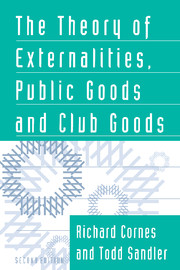Book contents
- Frontmatter
- Contents
- List of tables and figures
- Preface
- Part I Introduction to the theory of externalities, public goods, and club goods
- Part II Externalities
- Part III Public goods
- Part IV Clubs and club goods
- 11 Homogeneous clubs and local public goods
- 12 Clubs in general
- 13 Institutional forms and clubs
- 14 Game theory and club goods
- 15 Uncertainty and the theory of clubs
- 16 Intergenerational clubs
- Part V Applications and future directions
- References
- Author index
- Subject index
12 - Clubs in general
Published online by Cambridge University Press: 05 June 2012
- Frontmatter
- Contents
- List of tables and figures
- Preface
- Part I Introduction to the theory of externalities, public goods, and club goods
- Part II Externalities
- Part III Public goods
- Part IV Clubs and club goods
- 11 Homogeneous clubs and local public goods
- 12 Clubs in general
- 13 Institutional forms and clubs
- 14 Game theory and club goods
- 15 Uncertainty and the theory of clubs
- 16 Intergenerational clubs
- Part V Applications and future directions
- References
- Author index
- Subject index
Summary
This chapter extends the analysis of clubs begun in Chapter 11. Inasmuch as club analysis provides the underlying theory for study of local public goods, the study of these goods is also indirectly extended here. Chapter 11 focused on homogeneous-member clubs. Of the eight categories listed in Table 11.1, cells A and B were of primary interest in Chapter 11. This current chapter focuses on the remaining six cells, C–H. The case is studied in which some individuals in the population are excluded from the set of homogeneous clubs. This leads us into a more detailed discussion of the within-club and total-economy distinction, which depends on whose utility is included in the objective function. We are also concerned here with mixed clubs, especially those in categories G and H, in which the population is not partitioned, that is, categories in which a predetermined number of clubs exists (Berglas, Helpman, and Pines 1982). Additionally, we consider core solutions in which mixed clubs are carved out of a heterogeneous population, that is, clubs in categories E and F. Under fortuitous circumstances, these clubs may yield a core solution without the need to segregate populations according to tastes as in the work of Pauly (1967). Multiple mixed clubs can form and may yield utilities as good as, but not better than, that for a segregated partition (Scotchmer and Wooders 1987).
There is a rich array of club models in the literature, and we must be selective when presenting a general analysis.
- Type
- Chapter
- Information
- The Theory of Externalities, Public Goods, and Club Goods , pp. 370 - 393Publisher: Cambridge University PressPrint publication year: 1996



